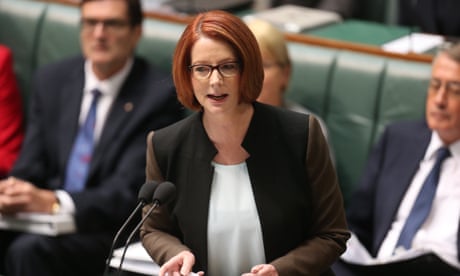- by foxnews
- 08 Apr 2025
Will a hung parliament lead to ‘chaos’? What a Gillard v Morrison comparison reveals
Will a hung parliament lead to ‘chaos’? What a Gillard v Morrison comparison reveals
- by theguardian
- 05 May 2022
- in news

The prime minister, Scott Morrison, and his treasurer, Josh Frydenberg, have both said voting for independent candidates in the federal election could lead to the "chaos" of a hung parliament.
However, a Guardian Australia analysis of legislation passed and not passed under various governments shows the minority government led by Julia Gillard actually had a better success rate in passing legislation than the Morrison government.
Using records published by the parliament of Australia, it's possible to see a summary of the number of bills introduced by the government and how many were passed by both houses. This excludes private member's and senator's bills. You can read more details about the methods below.
The data shows that despite having to negotiate with independents to pass legislation through the House of Representatives, Julia Gillard's government has the second-highest percentage of passed legislation:
Gillard's government ranks behind only the 41st parliament in which John Howard won control of both the House and the Senate, something which rarely occurs.
Lowest on the list are the Abbott, Turnbull-Morrison and Rudd governments - all of which involved governments having to make deals with Senates described as "hostile" and "feral".
The 2019 Morrison government has had notable struggles passing its own legislation, with the voter identification legislation lacking support, and its religious discrimination bill failing to move through the Senate. Another key policy, legislation to establish a federal anti-corruption body, was not introduced at all, with Morrison blaming a lack of support for the government's preferred approach.
Gillard's government also scores higher than Morrison's when looking at the overall rate of legislation passed a day, an index I've previously described as "productivity in parliament".
This is an updated version of an analysis I've done previously, which makes an attempt to look at the ability of a government to pass legislation, and the volume. Basically, it takes the number of acts passed within a prime minister's term, and divides this number by their term length.
This is a quantity over quality approach, and obviously not all governments will try to pass as many bills as another. Some will prefer a "small government" approach, for example (but even removing "red tape" mostly requires legislating).
As with previous versions of this analysis it again shows the Gillard minority government ranking the highest, with Morrison's term as prime minister sitting between Kevin Rudd and Tony Abbott:
Last month Frydenberg warned in a media conference this was not the time to take a chance on "the chaos of a hung parliament".
Similarly, when asked during an interview on Tuesday whether he would negotiate with independents, Morrison said he would not.
"This is a real question for the people who are voting at this election," he told 3AW. "Voting for the independents is a vote for chaos."
It should be noted that both of the above analyses do not count the number of bills lost to failed negotiations prior to the introduction of legislation.
However, in the context of minority governments, or governments that have a minority in the upper house, these indexes may give us an indication of which governments were better and worse in their negotiations with crossbenchers or the opposition.
The amount of passed and not passed legislation was obtained using the parliament of Australia's bills search with the relevant options checked. These results were crosschecked with counts obtained from the parlinfo export legislation tool here.
For the rate of bills passed a day, the methods are the same as for previous articles. I took all of the Commonwealth of Australia Numbered Acts and assigned them to a prime minister, political party and parliament based on the date it was passed through the Senate.
From this dataset, I counted the total acts for each prime minister, party and parliament. Then I determined the number of days in office for each prime minister and the number of days each parliament and party governed.
You can read the previous articles about the Gillard government here, and the Abbott government here.
- by foxnews
- descember 09, 2016
Ancient settlement reveals remains of 1,800-year-old dog, baffling experts: 'Preserved quite well'
Archaeologists have recently unearthed the remarkably well-preserved remains of a dog from ancient Rome, shedding light on the widespread practice of ritual sacrifice in antiquity.
read more


